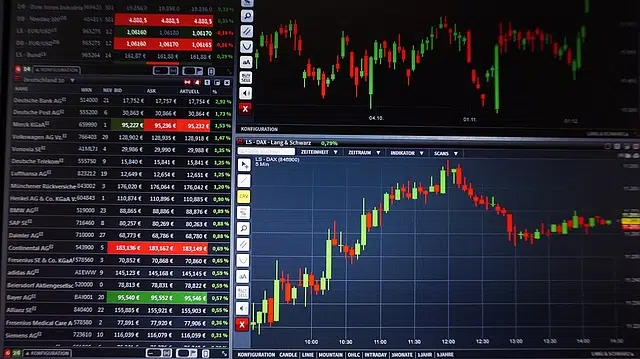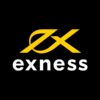Welcome to our comprehensive review of the top CFD brokers for 2023, where we will compare fees and analyze the trading platforms offered by these brokers. If you’re looking to trade CFDs, it’s essential to choose a reliable broker that suits your trading needs. In this article, we will provide you with valuable insights to help you make an informed decision.

Key Takeaways:
- Compare fees and trading platforms offered by top CFD brokers for 2023.
- Consider key factors such as minimum deposits, account opening times, and popularity among traders.
- Analyze trading costs, including spreads and commissions, as well as non-trading fees like deposit and withdrawal fees.
- Evaluate the trustworthiness and regulation of CFD brokers to ensure the safety of your funds and personal information.
- Explore the product selection and asset diversity offered by brokers to ensure they align with your trading goals.
Exploring the Best CFD Brokers
Let’s explore the best Contracts for Difference brokers for 2023, taking a closer look at their unique features, minimum deposit requirements, account opening times, and overall popularity. In today’s competitive market, finding a reliable and reputable CFD broker is essential for traders looking to enter the world of online trading. With a wide range of brokers available, it can be overwhelming to choose the right one. But don’t worry, we’ve done the research for you and compiled a list of the top Contracts for Difference brokers you should consider.
| Broker | Key Features | Minimum Deposit | Account Opening Time | Popularity |
|---|---|---|---|---|
| XTB | Advanced trading platforms, extensive educational resources | $250 | Within 24 hours | High |
| eToro | Social trading, copy trading features, wide range of markets | $200 | Within 24 hours | High |
| Admirals | MT4 and MT5 platforms, competitive spreads | $100 | Within 24 hours | Medium |
| Capital.com | AI-powered trading platform, zero commission on stocks | $20 | Instant | High |
These are just a few of the top CFD brokers available, and each offers its own unique features and advantages. XTB stands out for its advanced trading platforms and extensive educational resources, making it a great choice for both beginner and experienced traders. eToro, on the other hand, is known for its social trading and copy trading features, allowing traders to learn from and mimic the strategies of successful traders. Admirals excels in providing the popular MT4 and MT5 platforms, along with competitive spreads. And Capital.com offers an AI-powered trading platform and zero commission on stocks, making it an attractive option for cost-conscious traders.
When choosing a CFD broker, it’s important to consider your individual trading needs and preferences. Factors such as minimum deposit requirements, account opening times, and the popularity of the broker among traders can play a significant role in your decision-making process. By exploring the best Contracts for Difference brokers and comparing their features, you can find the one that best suits your trading style and goals.
Additional Broker Options
- Plus500: Commission-free trading, user-friendly platform, wide range of markets
- IG: Large selection of markets, powerful trading platform
- nextmarkets: Expert trading ideas, innovative trading platform
- Trading 212: Fractional shares trading, user-friendly mobile app
- City Index: Advanced charting tools, extensive market analysis
- XM: Competitive spreads, multiple trading platforms
Remember, thorough research and due diligence are crucial when choosing a CFD broker. Take the time to explore the options, consider your trading goals, and select the broker that best aligns with your needs. Happy trading!
Comparing Trading Platforms
When it comes to trading Contracts for Differences, choosing the right platform is crucial. In this section, we will compare and evaluate the trading platforms offered by the top CFD brokers. We will delve into the features, functionality, ease of use, and reliability of these platforms, helping traders make an informed decision.
One of the top-rated CFD platforms is provided by XTB. Their platform offers a user-friendly interface with advanced charting tools and a wide range of technical indicators. It also supports one-click trading and allows for easy customization, making it suitable for both beginner and experienced traders. XTB’s platform is available on desktop, web, and mobile devices, ensuring access to the markets anytime, anywhere.
Another broker with a robust trading platform is eToro. Their platform stands out for its unique social trading features, allowing users to interact with and copy the trades of successful traders. It also provides a wide range of educational resources and market analysis tools, empowering traders with the knowledge they need to make informed trading decisions. With eToro’s platform, traders can engage in both manual and automated trading.
| Broker | Key Features | Minimum Deposit | Account Opening Time | Popularity |
|---|---|---|---|---|
| XTB | Advanced charting tools, one-click trading, mobile-friendly | $250 | Up to 1 business day | High |
| eToro | Social trading, educational resources, market analysis | $200 | Within minutes | Very high |
These are just a couple of examples of the top-rated CFD trading platforms available. Other brokers, such as Admirals, Capital.com, Plus500, IG, nextmarkets, Trading 212, City Index, and XM, also offer competitive platforms with varying features and strengths. Traders should consider factors such as ease of use, available tools, and compatibility with their trading style when selecting a platform that suits their needs.
By comparing the trading platforms offered by the top CFD brokers, traders can gain insights into the features and functionality that will enhance their trading experience. It is important to choose a platform that aligns with their trading goals and preferences, as it can greatly impact their success in the CFD markets.
Fee Comparison: Trading Costs and Non-Trading Fees
In this section, we will conduct a thorough fee comparison, analyzing both trading costs and non-trading fees associated with the top CFD brokers. A comprehensive understanding of the fees involved is crucial for traders when selecting a broker that aligns with their trading strategy and budget.
Let’s begin by examining the trading costs at the selected CFD brokers. We have assessed spreads and commissions across various asset classes, including stocks, indices, commodities, and cryptocurrencies. Our analysis revealed that XTB offers competitive spreads, making it an attractive choice for traders seeking low-cost trading options. eToro, on the other hand, stands out with its commission-free stock trading, allowing traders to benefit from cost-effective investment opportunities.
In addition to trading fees, non-trading fees are also an important consideration. These fees include deposit and withdrawal charges, account maintenance fees, and inactivity fees. Among the brokers we reviewed, Admirals and Capital.com emerged as the top choices for traders looking to minimize non-trading fees. Admirals offers commission-free deposits and withdrawals, while Capital.com imposes no account maintenance or inactivity fees.
Summary of Trading Costs and Non-Trading Fees
| Broker | Trading Costs | Non-Trading Fees |
|---|---|---|
| XTB | Competitive spreads | Standard deposit and withdrawal fees |
| eToro | Commission-free stock trading | No account maintenance or inactivity fees |
| Admirals | Low spreads | Commission-free deposits and withdrawals |
| Capital.com | Tight spreads | No account maintenance or inactivity fees |
It’s important to note that while trading costs and non-trading fees are key factors to consider, they should not be the sole determinants when choosing a CFD broker. Traders should also evaluate other aspects, such as trading platforms, regulatory compliance, customer support, and available research and educational resources, to make a well-informed decision that aligns with their trading goals and preferences.
Evaluating Trustworthiness and Regulation
Trust is paramount in the financial industry, particularly when it comes to choosing a CFD broker. In this section, we will evaluate the trustworthiness and regulatory compliance of the top CFD brokers. When considering a broker, it is important to ensure that they are properly regulated by reputable financial authorities.
One of the key regulatory bodies in the financial industry is the Financial Conduct Authority (FCA) in the United Kingdom. Brokers regulated by the FCA are subject to stringent requirements and are expected to adhere to strict guidelines to ensure the protection of client funds and maintain fair trading practices. Other well-regarded regulatory bodies include the Australian Securities and Investments Commission (ASIC) and the Cyprus Securities and Exchange Commission (CySEC).
When comparing CFD brokers, it is essential to look for those who have obtained proper regulatory licenses. A regulated broker is a sign of trustworthiness and provides traders with a level of protection in case of any issues or disputes. Additionally, regulatory oversight ensures that brokers meet certain standards of financial conduct and maintain transparent operations.
Regulatory Compliance of Top CFD Brokers
| Broker | Regulator | License Number |
|---|---|---|
| XTB | FCA | FRN 522157 |
| eToro | FCA, ASIC, CySEC | FCA: FRN 583263, ASIC: AFSL 491139, CySEC: 109/10 |
| Admirals | FCA, ASIC, CySEC | FCA: FRN 595450, ASIC: AFSL 410681, CySEC: 201/13 |
| Capital.com | FCA, CySEC | FCA: FRN 793714, CySEC: 319/17 |
These are just a few examples of the regulatory compliance of some top CFD brokers. It is always recommended to conduct thorough research and verify the regulatory status of any broker under consideration before opening an account.
Product Selection and Asset Diversity
A diverse product selection is essential for CFD traders. In this section, we will assess the product offerings and asset diversity provided by the top CFD brokers. When choosing a broker, traders should consider the range of markets available for trading, including stocks, indices, commodities, and cryptocurrencies.
Let’s take a closer look at the top CFD brokers and the products they offer:
| Broker | Product Selection | Asset Diversity |
|---|---|---|
| XTB | Wide range of CFDs including forex, stocks, indices, commodities, and cryptocurrencies | Diverse selection of assets across various markets |
| eToro | Coverage of major CFD markets, including stocks, indices, commodities, and cryptocurrencies | Offers a selection of popular assets with a focus on social trading |
| Admirals | Extensive list of CFDs, including forex, stocks, indices, commodities, and cryptocurrencies | Wide range of asset classes and markets to choose from |
Additionally, Capital.com, Plus500, IG, nextmarkets, Trading 212, City Index, and XM also offer a diverse range of CFD products, catering to the varying needs and preferences of traders. It is important for traders to evaluate the availability of specific assets they are interested in trading and ensure that the broker’s product selection aligns with their trading strategy.
By choosing a broker with a wide range of products and asset diversity, traders can have access to a larger pool of opportunities and potentially diversify their portfolios effectively. It is recommended for traders to carefully compare the product offerings and asset diversity provided by different CFD brokers before making their final decision.
What is CFD Trading?
Before we dive deeper into the world of CFD brokers, it is essential to understand what CFD trading is and how it works. CFD stands for Contract for Difference, which is a financial derivative product that allows traders to speculate on the price movements of various assets, including stocks, indices, commodities, and cryptocurrencies, without actually owning the underlying asset.
How Does CFD Trading Work?
When trading CFDs, traders enter into a contract with a broker to exchange the difference in the price of an asset from the time the contract is opened to the time it is closed. If a trader believes the price of the asset will rise, they can buy (go long) the CFD, and if they believe the price will fall, they can sell (go short) the CFD. The profit or loss is determined by the difference between the opening and closing prices of the CFD.
One of the key advantages of CFD trading is the ability to leverage trades, which means traders can control larger positions with a smaller amount of capital. However, it’s important to note that leverage can amplify both profits and losses, so risk management is crucial when trading CFDs.
The Benefits of Online CFD Trading
Online CFD trading has become increasingly popular due to its accessibility and flexibility. Traders can access the global financial markets from the comfort of their own homes or on the go using mobile trading platforms. Additionally, CFDs offer the opportunity to profit from both rising and falling markets, as traders can take advantage of price movements in either direction.
Furthermore, many CFD brokers provide a wide range of trading tools and features, such as stop-loss orders, take-profit orders, and risk management tools, to help traders protect their capital and manage their risk effectively. These features, combined with real-time market analysis and educational resources, empower traders to make informed trading decisions.
| Key Aspects of CFD Trading | Benefits |
|---|---|
| Leverage | Control larger positions with less capital |
| Access to Global Markets | Trade a wide range of assets from around the world |
| Opportunity to Profit from Rising and Falling Markets | Take advantage of price movements in either direction |
| Range of Trading Tools and Features | Manage risk effectively with stop-loss and take-profit orders |
| Real-Time Market Analysis and Educational Resources | Access valuable information to make informed trading decisions |
As with any form of trading, it is important to conduct thorough research, carefully consider your risk tolerance, and choose a reputable CFD broker that aligns with your trading goals and needs. Now that we have a basic understanding of CFD trading, let’s explore the top CFD brokers in South Africa and their key features.
The Top CFD Brokers in South Africa
South African traders have unique requirements when it comes to CFD trading. In this section, we will explore the top CFD brokers that cater to the South African market. These brokers offer a range of features and services designed to meet the needs of local traders, ensuring a seamless and secure trading experience.
One of the top CFD brokers in South Africa is XTB. With a minimum deposit of only $250, XTB provides traders with access to a wide range of financial instruments, including stocks, indices, commodities, and cryptocurrencies. They offer a user-friendly trading platform and provide excellent customer support, making them a popular choice among South African traders.
Another reputable broker in the South African market is eToro. Known for its social trading platform, eToro allows traders to follow and copy the trades of successful investors. With a minimum deposit of $200, eToro offers a diverse range of CFDs and is regulated by top-tier authorities, providing traders with peace of mind.
| Broker | Minimum Deposit | Account Opening Time | Popularity Among Traders |
|---|---|---|---|
| XTB | $250 | Less than 24 hours | High |
| eToro | $200 | Less than 24 hours | High |
Admirals is another CFD broker worth considering in South Africa. With a minimum deposit of $100, Admirals offers competitive spreads, a robust trading platform, and a wide range of educational resources. They are regulated by reputable authorities, ensuring the safety of traders’ funds.
When selecting a CFD broker in South Africa, it is important to consider factors such as local regulations, customer support, and payment options. By choosing one of the top CFD brokers mentioned above, traders can benefit from a reliable and trusted trading environment.

Key Considerations for Choosing a CFD Broker
Choosing the right CFD broker is essential for successful trading. In this section, we will outline key considerations to help you select the best CFD broker for your needs.
1. Regulation and Trustworthiness: When choosing a CFD broker, it is crucial to ensure they are regulated by a reputable authority. This provides oversight and protection for your funds. Look for brokers regulated by respected bodies such as the Financial Conduct Authority (FCA) or the Australian Securities and Investments Commission (ASIC). Additionally, consider the broker’s track record, reputation, and customer reviews to assess their trustworthiness.
2. Trading Platform: A user-friendly and reliable trading platform is essential for effective trading. Consider the broker’s trading platform and evaluate its features, functionality, and ease of use. Look for customizable charts, real-time market data, and advanced order types. A demo account is also valuable for testing the platform’s features before committing your funds.
3. Product Selection: Assess the range of markets and assets offered by the CFD broker. Look for brokers that offer a diverse selection of assets, including stocks, indices, commodities, and cryptocurrencies. This allows you to diversify your trading portfolio and take advantage of various trading opportunities.
| Broker | Key Features | Minimum Deposit | Account Opening Time | Popularity |
|---|---|---|---|---|
| XTB | Advanced trading platform, educational resources | $250 | 1-3 business days | High |
| eToro | Social trading, copy trading | $200 | Immediate | Very High |
| Admirals | MT4 and MT5 platforms, extensive asset selection | $200 | 1-3 business days | High |
4. Trading Costs: Consider the trading costs associated with each broker. Compare factors such as spreads, commissions, and overnight fees. Lower trading costs can significantly impact your profitability in the long run. However, keep in mind that lower costs should be balanced with the broker’s overall quality and reputation.
5. Customer Support: Assess the quality and availability of customer support. Look for brokers that offer multiple support channels, such as live chat, email, and phone support. Prompt and knowledgeable customer support can greatly assist you in addressing any issues or concerns that may arise during your trading journey.
By considering these key factors, you can make an informed decision when choosing a CFD broker that aligns with your trading goals and preferences. Remember to research and compare different brokers to find the one that best suits your needs.
The Importance of Demo Accounts
Demo accounts play a crucial role in the evaluation of CFD brokers. In this section, we will discuss the significance of demo accounts and how they can assist traders in making informed decisions.
One of the key advantages of using a demo account is the ability to test the trading platform provided by a CFD broker. Traders can familiarize themselves with the platform’s features, functions, and overall user experience without risking any real money. This is especially beneficial for those who are new to CFD trading or considering switching to a new broker.
Another important aspect of demo accounts is the opportunity to test trading strategies in a risk-free environment. Traders can practice different strategies, analyze the performance of their trades, and fine-tune their approach without the fear of losing real funds. This allows them to gain confidence in their trading abilities and make necessary adjustments before trading with real money.
Table: Comparison of Top CFD Brokers’ Demo Accounts
| CFD Broker | Demo Account Features | Availability |
|---|---|---|
| XTB | Unlimited virtual funds, real-time market data, access to all trading instruments | Available to all clients |
| eToro | $100,000 virtual balance, social trading capabilities, access to the eToro community | Available to all clients |
| Admirals | €10,000 virtual funds, real-time market conditions, personal support from account manager | Available to all clients |
It is worth noting that demo accounts are not only beneficial for beginners but also experienced traders. Even seasoned traders can use demo accounts to test new strategies, explore different markets, or experiment with advanced trading tools and features offered by CFD brokers.
Overall, demo accounts provide traders with a risk-free environment to gain valuable experience, test strategies, and evaluate CFD brokers without the fear of financial loss. They are an essential tool for traders to assess the quality of a broker’s trading platform, execution speed, and overall user experience, enabling them to make informed decisions when choosing a CFD broker.
Research and Education Resources
Ongoing education and access to quality research are vital components for successful trading. In this section, we will explore the research and education resources provided by the top CFD brokers. These resources play a crucial role in helping traders make informed decisions, develop their skills, and stay up-to-date with market trends.
When it comes to research tools, the top CFD brokers offer a range of options. This includes comprehensive market analysis, daily market updates, and economic calendars. These resources provide valuable insights into market trends, helping traders identify potential opportunities and make well-informed trading decisions.
Education is equally important, and the best CFD brokers provide a wealth of educational resources. These include video tutorials, webinars, ebooks, and online courses. These resources cater to traders of all levels, from beginners looking to understand the basics of CFD trading to experienced traders seeking advanced strategies and techniques.
| Research Resources | Educational Resources |
|---|---|
| Comprehensive market analysisDaily market updatesEconomic calendars | Video tutorialsWebinarsEbooksOnline courses |
Ongoing education and access to quality research are vital components for successful trading.
It’s important to note that the availability and quality of research and educational resources can vary among CFD brokers. Traders are advised to consider their individual learning needs and preferences when selecting a broker. Taking advantage of these resources can significantly enhance a trader’s knowledge, skills, and overall trading performance.
In conclusion, the top CFD brokers prioritize research and education resources to support their traders. By providing comprehensive market analysis, daily updates, educational materials, and more, these brokers empower traders to make well-informed decisions and improve their trading strategies.
Risk Management Tools and Features
Risk management is a critical aspect of CFD trading. In this section, we will examine the risk management tools and features offered by the top CFD brokers. These tools are designed to assist traders in mitigating potential losses and protecting their capital. By utilizing these features, traders can gain more control over their trades and minimize the impact of market volatility.
One of the key risk management tools provided by CFD brokers is the stop-loss order. This feature allows traders to set a predefined price at which their position will automatically be closed, limiting potential losses. Additionally, some brokers may offer trailing stop-loss orders, which adjust the stop price as the trade moves in favor of the trader, ensuring that profits are locked in and potential losses are minimized.
Another important risk management tool is the take-profit order. This feature enables traders to set a specific price at which their position will be automatically closed, securing profits. By utilizing take-profit orders, traders can capitalize on favorable market movements without the need to constantly monitor their trades.
| Broker | Risk Management Tools |
|---|---|
| XTB | Stop-loss orders, take-profit orders |
| eToro | Stop-loss orders, take-profit orders |
| Admirals | Stop-loss orders, take-profit orders |
| Capital.com | Stop-loss orders, take-profit orders |
In addition to stop-loss and take-profit orders, some CFD brokers may offer negative balance protection. This means that traders cannot lose more than the funds available in their trading account. In highly volatile markets, where prices can change rapidly, negative balance protection can provide peace of mind for traders.
It is worth noting that while risk management tools can help minimize losses, they do not guarantee profits or eliminate all risks associated with CFD trading. Traders should always educate themselves on the risks involved and develop a comprehensive risk management strategy that suits their individual trading style and financial goals.
Customer Service and Support
Reliable customer service is vital for a seamless trading experience. In this section, we will evaluate the customer service and support offered by the top CFD brokers. Traders need prompt and efficient assistance when encountering issues or seeking clarification on trading matters. Therefore, we have conducted a thorough assessment of the customer service capabilities of the leading CFD brokers to determine their commitment to client satisfaction.
Our evaluation encompasses multiple aspects of customer service, including the availability of support channels, responsiveness, and the quality of assistance provided. The top CFD brokers understand the importance of being accessible to their clients and offer various means of communication, such as live chat, email, and telephone support. This ensures that traders can connect with a representative conveniently, regardless of their preferred communication method.
To further assess the efficiency and effectiveness of customer service, we have tested the response times of the brokers’ support teams. A prompt response is crucial, especially during critical trading situations. Our findings indicate that the top CFD brokers prioritize quick and helpful support, aiming to address client queries and concerns promptly.
Additionally, we have considered the quality of assistance provided by the customer service teams. The top CFD brokers have well-trained and knowledgeable staff who are capable of offering comprehensive guidance and support. They are equipped to handle a wide range of topics, from account-related inquiries to technical issues, ensuring that traders receive accurate and relevant information to facilitate their trading activities.
| Broker | Support Channels | Response Times | Quality of Assistance |
|---|---|---|---|
| XTB | Live Chat, Email, Phone | Fast | Knowledgeable and helpful |
| eToro | Live Chat, Email | Prompt | Comprehensive and friendly |
| Admirals | Live Chat, Email, Phone | Quick | Professional and informative |
| Capital.com | Live Chat, Email | Responsive | Helpful and efficient |
| Plus500 | Live Chat, Email | Timely | Polite and knowledgeable |
The table above provides a summary of our findings regarding the customer service and support offered by the top CFD brokers. Please note that these rankings are based on our evaluation and may be subject to change. Traders are encouraged to consider these factors when selecting a CFD broker to ensure a satisfactory trading experience.
Regulation and Security Measures
Regulatory compliance and security measures are crucial factors to consider when choosing a CFD broker. In this section, we will examine the regulatory and security measures implemented by the top CFD brokers.
When it comes to regulation, all of the top CFD brokers we have reviewed are authorized and regulated by respected financial authorities. XTB, eToro, Admirals, Capital.com, Plus500, IG, nextmarkets, Trading 212, City Index, and XM are all regulated by reputable bodies such as the Financial Conduct Authority (FCA), the Cyprus Securities and Exchange Commission (CySEC), and the Australian Securities and Investments Commission (ASIC), among others. These regulatory bodies ensure that brokers adhere to strict guidelines and follow industry best practices, providing traders with a level of trust and confidence.
In addition to regulatory compliance, the top CFD brokers also prioritize security measures to protect their clients’ funds and personal information. They employ advanced security protocols, including encryption technology, multi-factor authentication, and secure socket layers (SSL), to safeguard sensitive data from unauthorized access. These brokers also maintain segregated client accounts, ensuring that traders’ funds are kept separate from the broker’s operating capital.
| Regulatory Body | Broker |
|---|---|
| Financial Conduct Authority (FCA) | XTB, eToro, Capital.com, IG, City Index |
| Cyprus Securities and Exchange Commission (CySEC) | Admirals, Plus500, XM |
| Australian Securities and Investments Commission (ASIC) | Trading 212 |
In conclusion, the top CFD brokers prioritize regulatory compliance and implement comprehensive security measures to ensure the safety of their clients’ funds and personal information. By choosing a regulated broker with robust security measures, traders can have peace of mind and focus on their trading strategies and goals.
Conclusion
After thoroughly reviewing the top CFD brokers for 2023, we can conclude that these brokers offer a range of features and options for traders, making it important to carefully consider your individual needs and preferences when choosing a CFD broker.
Among the top CFD brokers in 2023, XTB, eToro, Admirals, Capital.com, Plus500, IG, nextmarkets, Trading 212, City Index, and XM stand out for their key features, minimum deposits, account opening times, and popularity among traders. Each broker has its own unique advantages, such as user-friendly trading platforms, competitive fees, and a wide range of tradable assets.
When comparing the trading platforms provided by these top CFD brokers, it is essential to consider factors such as features, functionality, ease of use, and reliability. Additionally, traders should assess the overall cost of trading by analyzing both trading fees, such as spreads and commissions, and non-trading fees, such as deposit and withdrawal fees.
Trustworthiness and regulation are also crucial considerations when choosing a CFD broker. Traders should look for brokers regulated by reputable authorities, such as the Financial Conduct Authority (FCA) or the Cyprus Securities and Exchange Commission (CySEC), as these regulatory bodies provide oversight and ensure client fund protection.
Furthermore, the product selection and asset diversity offered by the top CFD brokers should be evaluated. The availability of a wide range of markets, including stocks, indices, commodities, and cryptocurrencies, allows traders to diversify their portfolios and take advantage of various trading opportunities.
For South African traders, it is worth considering brokers that cater specifically to their needs. Factors such as local regulations, customer support, and convenient payment options should be taken into account when selecting a CFD broker in South Africa.
In conclusion, choosing the right CFD broker requires careful consideration of various factors, such as trading platforms, fees, trustworthiness, product selection, and customer support. By thoroughly researching and comparing the top CFD brokers for 2023, traders can make an informed decision that aligns with their trading goals and preferences.
FAQ
Q: What is CFD trading?
A: CFD trading stands for Contract for Difference trading. It is a popular derivative trading method that allows traders to speculate on the price movement of various financial instruments, such as stocks, indices, commodities, and cryptocurrencies, without owning the underlying asset.
Q: What are the top CFD brokers for 2023?
A: Some of the top CFD brokers for 2023 include XTB, eToro, Admirals, Capital.com, Plus500, IG, nextmarkets, Trading 212, City Index, and XM. These brokers offer a range of features, competitive fees, and user-friendly trading platforms.
Q: How do I compare trading platforms offered by CFD brokers?
A: When comparing trading platforms offered by CFD brokers, consider factors such as features, functionality, ease of use, and reliability. Look for platforms that offer a wide range of tools, intuitive interface, and stability to enhance your trading experience.
Q: What are the trading costs and non-trading fees associated with CFD brokers?
A: Trading costs with CFD brokers can include spreads, commissions, and overnight financing charges. Non-trading fees may include deposit and withdrawal fees, inactivity fees, and currency conversion fees. It is important to consider these costs when choosing a CFD broker.
Q: How can I assess the trustworthiness of a CFD broker?
A: To assess the trustworthiness of a CFD broker, look for regulatory oversight from reputable financial authorities. Check if the broker segregates client funds, provides negative balance protection, and has a transparent track record. It is also helpful to read reviews and consider the broker’s reputation among traders.
Q: What factors should I consider when choosing a CFD broker?
A: When choosing a CFD broker, consider factors such as trading platform features, customer support, educational resources, account types, and product selection. It is also important to assess fees, regulation, and the broker’s suitability for your trading goals and location.
Q: Why are demo accounts important when evaluating CFD brokers?
A: Demo accounts are important when evaluating CFD brokers because they allow traders to test trading strategies, familiarize themselves with the platform, and assess the overall trading experience without risking real money. Demo accounts can help traders make more informed decisions about which broker to choose.
Q: What research and education resources do CFD brokers offer?
A: CFD brokers often provide research resources such as market analysis, educational materials, webinars, and trading tools. These resources can help traders stay informed about market trends, enhance their trading knowledge, and make more informed trading decisions.
Q: What risk management tools and features do CFD brokers offer?
A: CFD brokers may offer risk management tools such as stop-loss orders, take-profit orders, and negative balance protection. These tools can help traders manage risk, protect their capital, and limit potential losses in volatile markets.
Q: What customer service and support can I expect from CFD brokers?
A: CFD brokers should provide reliable customer service and support. Look for brokers that offer multiple support channels, such as phone, email, and live chat, and have responsive customer support teams. Prompt and helpful assistance can contribute to a positive trading experience.
Q: How do CFD brokers ensure regulation and security?
A: To ensure regulation and security, CFD brokers should be regulated by reputable financial authorities. They should follow strict compliance measures, segregate client funds, and implement data security protocols to protect traders’ personal information and funds.







